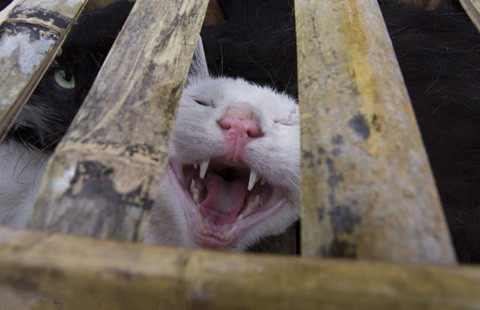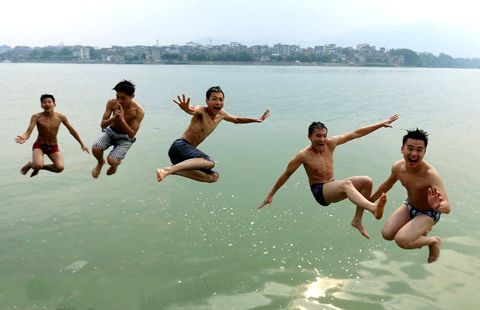Quake blamed for death of panda
Updated: 2014-06-30 08:15
By Huang Zhiling in Chengdu (China Daily)
|
||||||||
It will be at least 10 more years before vegetation is restored in the mountains of the Wolong National Nature Reserve - China's largest panda reserve - so that the terrain, weakened by the 2008 Wenchuan earthquake, will be more stable, a leading panda expert said.
Zhang Hemin, chief of the reserve's administrative bureau, made the remarks after an adult panda was found dead on Friday afternoon near the sluice gate of the Gengda Hydropower Station in Wolong, Sichuan province.
Zhang said damage from the Wenchuan catastrophe was to blame for the panda's death.
Panda experts from the China Conservation and Research Center for the Giant Panda in Wolong rushed to the scene and believed that the panda had been washed down from the mountains to the sluice gate by flash floods.
An autopsy showed that the 6- or 7-year-old female panda had died of massive bleeding in her brain about five to seven days earlier.
"Rains had lashed Wolong for several days and caused floods and many landslides. The panda was washed down by floods and found by locals," said Wei Rongping, deputy chief of the giant panda center.
The Wolong reserve, established in 1963, is home to about 150 wild pandas, accounting for about 10 percent of the world's total wild panda population. The center boasts 187 captive pandas, accounting for about 60 percent of the world's captive pandas.
The magnitude-8.0 Wenchuan earthquake jolted Sichuan province on May 12, 2008, killing 69,226 people; 17,923 people remain unaccounted for.
"After the earthquake, the face of the mountain at an altitude of 2,500 meters and below became loosened. Excessive rainfall can cause landslides. There have been reports of people and animals being injured by falling rocks," he said.
On March 31, Tang Rui, a middle-aged teacher living in the reserve, and his wife were hit by a gigantic rock. Tang was severely injured, and his wife died.
On July 6, 2011, a male panda about 10 years old drowned in the Zipingpu Reservoir near the reserve after it was washed away by a landslide triggered by a rainstorm.
Du Jun, Party chief of Gengda in Wolong, said his town will increase the monitoring of disaster-prone sites.
Zhang said: "Our staff members monitor 93 routes in Wolong for geological hazards. But the 200,000-hectare reserve is so huge that they cannot prepare for unexpected disasters all the time.
"It will take about one decade for vegetation to be restored to its full scale as before the earthquake," he said, adding that trees and other vegetation can help contain natural disasters in the mountainous natural reserve.
"Only in this way can there be no more major floods or landslides," he said.
Trees were first planted in the two towns in Wolong after the Wenchuan earthquake.
huangzhiling@chinadaily.com.cn

 Chilean wines find a market in China
Chilean wines find a market in China
 US admiral tours Chinese warship
US admiral tours Chinese warship
 Minister: Culture the strongest bond linking China, US
Minister: Culture the strongest bond linking China, US
 Bank of China opens branch in Queens
Bank of China opens branch in Queens
 Asian Film Festival gets underway with Overheard 3
Asian Film Festival gets underway with Overheard 3
 Food truck in San Francisco is going to the dogs
Food truck in San Francisco is going to the dogs Marine Barracks Evening Parade
Marine Barracks Evening Parade
 RIMPAC launches, with China
RIMPAC launches, with China
Most Viewed
Editor's Picks

|

|

|

|

|

|
Today's Top News
Xi pledges China will never seek hegemony
Evacuated Chinese fly home from Iraq
US navy commander visits Chinese fleet participating in drill
Chinese president stresses sovereign equality
China recalls prisoners serving terms outside jails
Surging hand-foot-mouth disease in Beijing
Benghazi attack suspect in federal custody
GM banks on Transformers for growth
US Weekly

|

|







